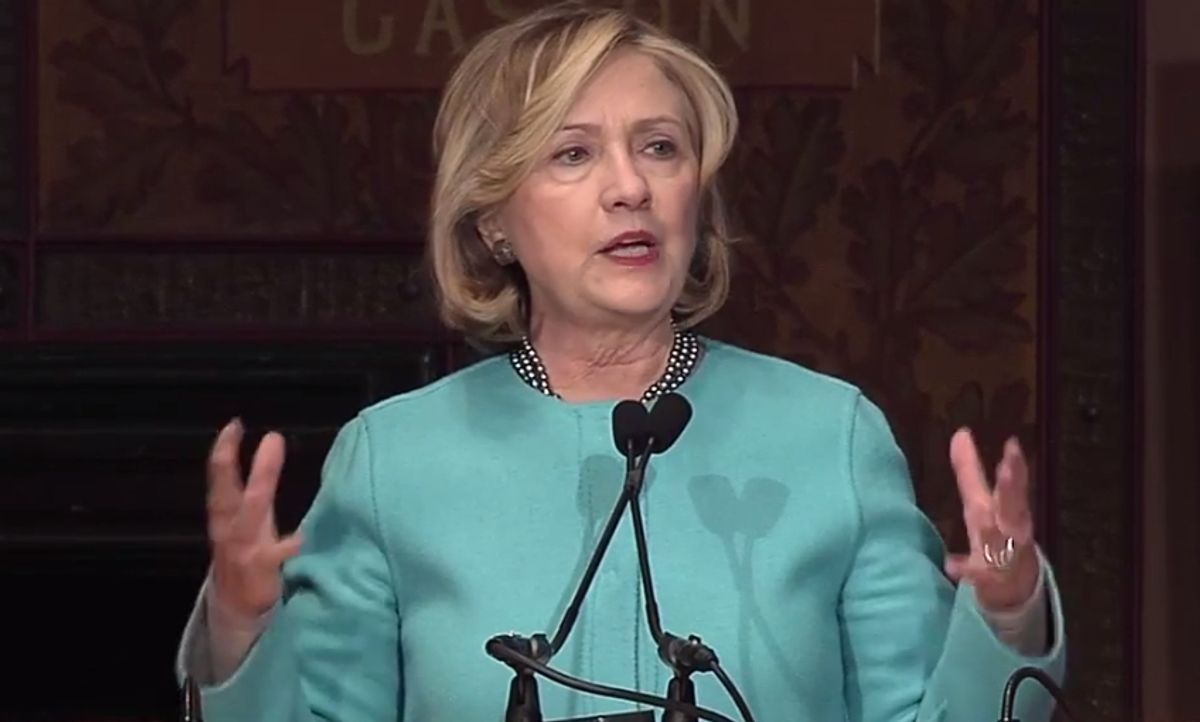Hillary Clinton delivered an address at Georgetown Institute for Women, Peace and Security, in which she advocated the role of women in diplomacy and the use of "smart power" in brokering and keeping the peace between warring factions.
Hillary Clinton did not beseech Americans to "respect and empathize with" the terrorist group ISIS.
In late August 2016, the 10-second video clip above was shared via social media by political partisans who claimed it documents Democratic presidential candidate Hillary Clinton beseeching Americans to "respect and empathize with" the terrorist group ISIS.
The clip consists entirely of the following sentence fragment, spoken while the phrase "RESPECTING OUR ATTACKERS" is superimposed in across the bottom of the image:
... showing respect even for one’s enemies, trying to understand, and insofar as is psychologically possible, empathize with their perspective and point of view ...
Those 23 words were indeed spoken by Clinton in a 2014 address at the Georgetown Institute for Women, Peace and Security, but, despite how they have been repackaged for propaganda purposes, had nothing to do with ISIS militants or Clinton's views on how the U.S. should deal with terrorists. In their original context, the words applied to the role women ought to play in diplomacy and the use of what Clinton termed "smart power" in brokering and keeping the peace between warring factions:
We know that when women contribute in making and keeping peace, entire societies enjoy better outcomes. We know that when women participate in the peace processes, often overlooked issues such as human rights, individual justice, national reconciliation, economic renewal are often brought to the forefront. Women leaders, it has been found, are good at building coalitions across ethnic and sectarian lines, and speaking up for other marginalized groups. I saw that in Northern Ireland, I saw that in Central America, I saw that, certainly, in the Congo, I saw that in osnia-Herzegovina. They act more as mediators to help foster compromise and to try to organize to create the changes they seek. So it's important to underscore this overriding fact. Women are not just victims of conflict; they are agents of peace and agents of change.
Consider what has happened recently in the Philippines. Mindanao, the second-largest island in the Philippines, has been locked in a 40-year conflict. The Moro Islamic Liberation Front was battling the government. More than 120,000 lives were lost. Hope for peace was all but gone when two strong women, Teresita Quintos Deles and Miriam Coronel-Ferrer, took over the negotiations. They made inclusivity their mantra. And thanks greatly to their efforts, finally a peace was brokered in a historic deal.
This is what we call smart power, using every possible tool and partner to advance peace and security, leaving no one on the sidelines, showing respect even for one's enemies, trying to understand, and insofar as psychologically possible, empathize with their perspective and point of view, helping to define the problems, determine the solutions — that is what we believe in the 21st century will change, change the prospects for peace.
So, whereas the purveyors of the deceptive clip above would like us to think that Clinton implored Americans to "respect our attackers" and "empathize with ISIS," what she actually said was that attempting to understand the point of view of one's enemies is one of many tools that can be employed in the service of "smart power."
Her speech in full can be viewed here:

